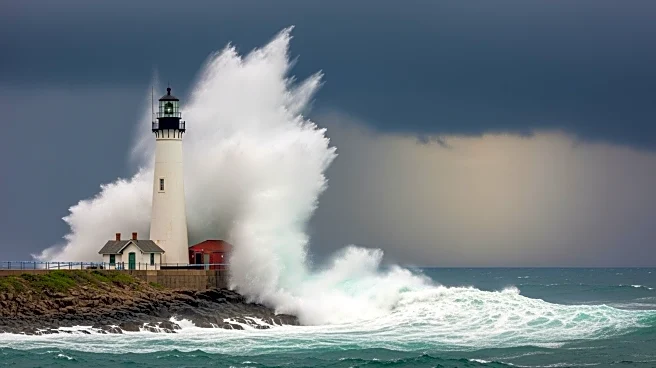What's Happening?
Hurricane Melissa is rapidly intensifying and is expected to become a major hurricane, posing significant threats to the Caribbean region. The National Hurricane Center in Miami has warned of life-threatening flash flooding and landslides in Jamaica and southern
Hispaniola, which includes Haiti and the Dominican Republic. As of Saturday evening, Melissa was a category two hurricane with sustained winds of 100 miles per hour, moving slowly at three miles per hour. This slow movement is likely to result in prolonged rainfall, exacerbating the risk of flooding. A hurricane watch is in effect for Haiti, and a hurricane warning has been issued for Jamaica. Jamaican officials have urged residents to prepare for the storm, which could be more severe than past hurricanes like Wilma in 2005. The National Hurricane Center forecasts that Melissa will make landfall in Jamaica early next week, with expected rainfall of 15-30 inches, and some areas could see up to 40 inches.
Why It's Important?
The intensification of Hurricane Melissa poses a severe threat to the Caribbean, with potential catastrophic impacts on infrastructure, agriculture, and human safety. The expected heavy rainfall and flooding could lead to significant displacement of communities, damage to homes, and disruption of essential services. The U.S. Navy has already evacuated non-essential personnel from Guantanamo Bay, Cuba, highlighting the seriousness of the situation. The economic impact could be substantial, affecting tourism and local economies dependent on agriculture and fishing. The humanitarian aspect is also critical, as vulnerable populations in Haiti and Jamaica may face life-threatening conditions, requiring international aid and support.
What's Next?
As Hurricane Melissa approaches, emergency services and government agencies in the affected regions are on high alert. Jamaica's National Water Commission has activated emergency protocols to ensure water supply to critical facilities. Residents are being warned to prepare for potential displacement and to be cautious of displaced wildlife, such as crocodiles. The National Hurricane Center continues to monitor the storm's path, with forecasts indicating possible landfall in Jamaica early next week. The situation demands ongoing vigilance and preparedness from local authorities and international aid organizations to mitigate the impact and provide relief to affected communities.
Beyond the Headlines
The intensification of Hurricane Melissa underscores the broader challenges posed by climate change, as warmer ocean temperatures contribute to more frequent and severe storms. This event highlights the need for improved infrastructure and disaster preparedness in vulnerable regions. The potential displacement of communities and wildlife also raises ethical and environmental concerns, necessitating a coordinated response to address both immediate and long-term impacts.














